From modest and humble beginnings, Jeanne Bécu Du Barry (1743-1793) rose to become one of the most powerful women in France. As headmistress to Louis XV, she was highly influential at court, in financial and political matters, but eventually, she fell victim to the Reign of Terror during the French Revolution. The life of Madame du Barry is a sordid tale of twists and turns, a tale of intrigue, deceit, promiscuity and self-promotion that would make today’s influencers blush. And since art is said to be imitating life, “Gräfin Dubarry” eagerly made her way onto the operetta stage. A cooperation between composer Karl Millöcker (1842-1899) and librettist F. Zell and Richard Genée, the work premiered on 31 October 1879 at the Theater an der Wien in Vienna. Critics were suitably impressed, but the “Countess Dubarry” was soon overshadowed by Millöcker’s biggest success “Der Bettelstudent (The Beggar Student). The Countess reemerged in 1931 in a completely new version prepared by Theo Mackeben with music from the original operetta and other works, and with a new text.
Millöcker/Mackeben: Die Dubarry, “Ja so ist sie, die Dubarry” (Ingeborg Hallstein, soprano; Grosses Operetten Chorus; Grosses Operetten Orchestra; Franz Marszalek, cond.)
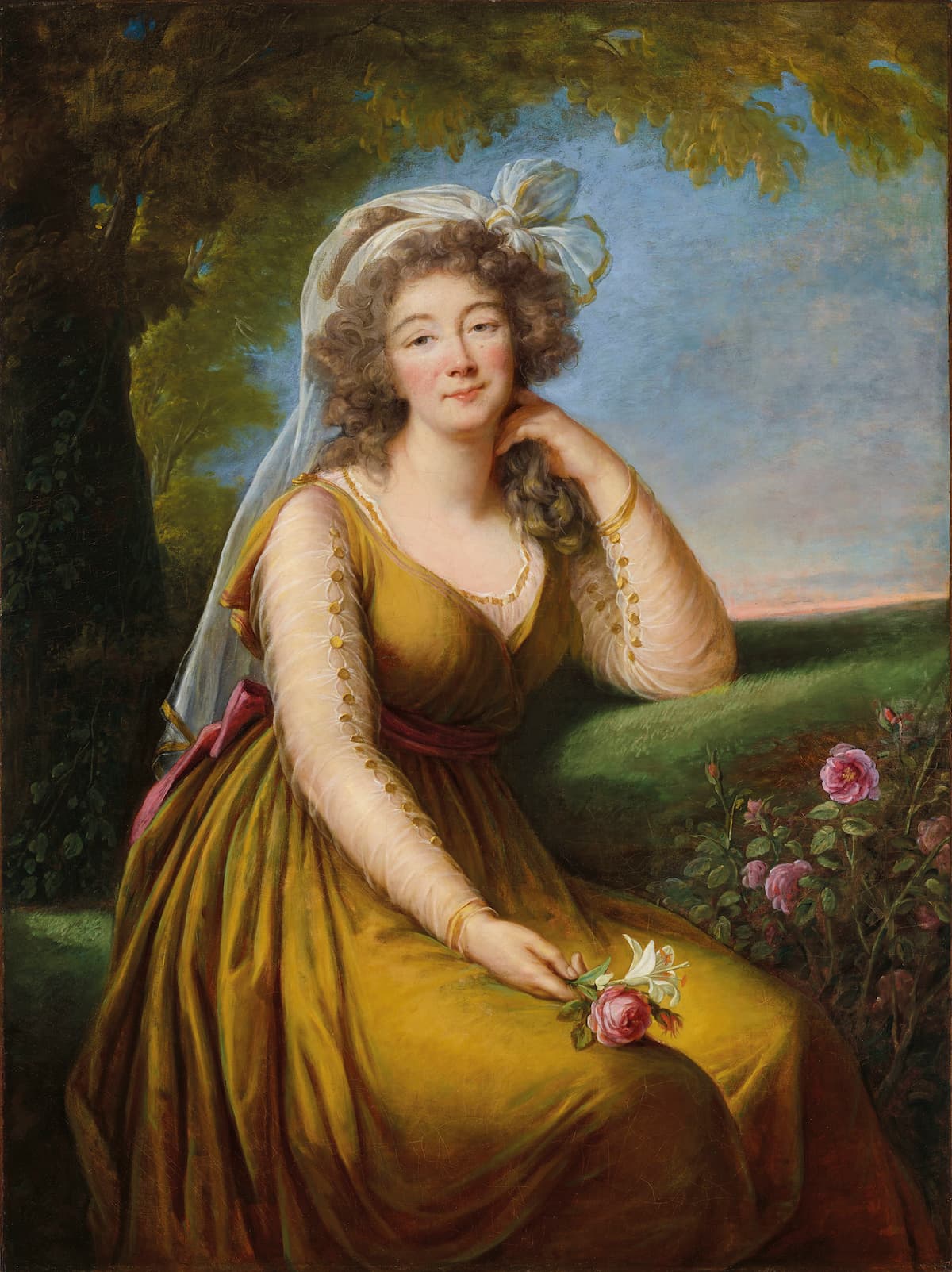
Élisabeth Louise Vigée Le Brun: Portrait of Madame du Barry
Jeanne Bécu Du Barry hailed from the Lorraine region of France, and while we know that her mother was a seamstress, her father is presumed to have been a local monk. The family moved to Paris, and Jeanne entered the convent at the age of fifteen. Apparently, she had an affair with two married men, and being forced to leave the convent, found work in a haberdashery shop. And that’s where the story of the operetta commences. Jeanne works as a cleaner, and she falls in love with the painter René Lavallery. They move in together, and when René is away, the Count Dubarry pays her a visit. He had previously noticed the pretty girl in an amusement park and now intends to use her for his evil plans. He pretends that he wants to buy a portrait of Jeanne, but she fends off his advances, and the Count has to depart the studio empty-handed.
Millöcker/Mackeben: Die Dubarry, “Ich schenk mein Herz” (Ingeborg Hallstein, soprano; Gunter Kallmann Choir; Grosses Operetten Orchestra; Franz Marszalek, cond.)
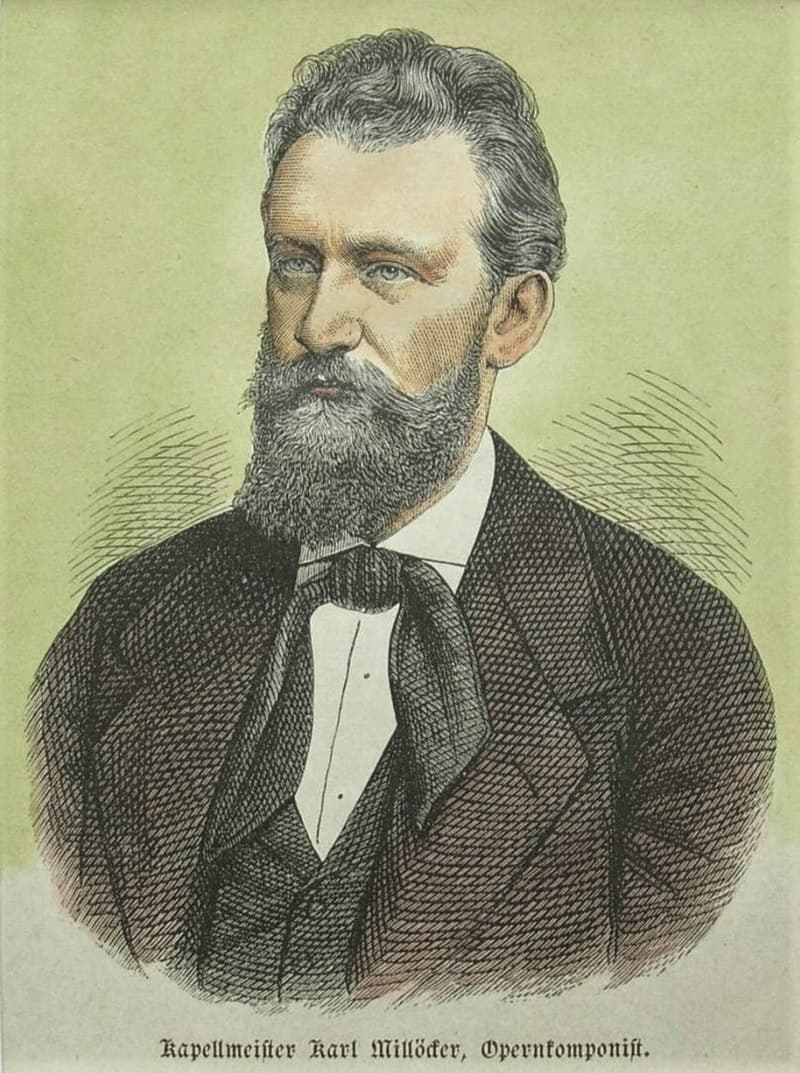
Karl Millöcker, 1883
When René returns, a gossipy neighbour informs him that his girlfriend had a lengthy visit from a dark and handsome stranger. In a fit of jealousy, and despite Jeanne’s protestations, René tells Jeanne that she has abused his trust and that the relationship is finished. Jeanne sadly leaves the house. A short time later, Count Dubarry is chatting with his friend the Marquis de Brissac. He tells him about a fabulously beautiful singer and dancer by the name of Manon, who is performing at a local bar. The Count decides to have a look, and immediately recognizes Jeanne. He now makes the decision to use Jeanne for his own political ambitions. King Louis XV is getting tired of his aging mistress Madam Pompadour, and he is looking for a replacement. He already has his eye on the sister of the Prime Minister, a connection fiercely opposed by Count Dubarry.
Millöcker/Mackeben: Die Dubarry, “Es lockt nie Nacht” (Ingeborg Hallstein, soprano; Heinz Hoppe, tenor; Gunter Kallmann Choir; Grosses Operetten Orchestra; Franz Marszalek, cond.)
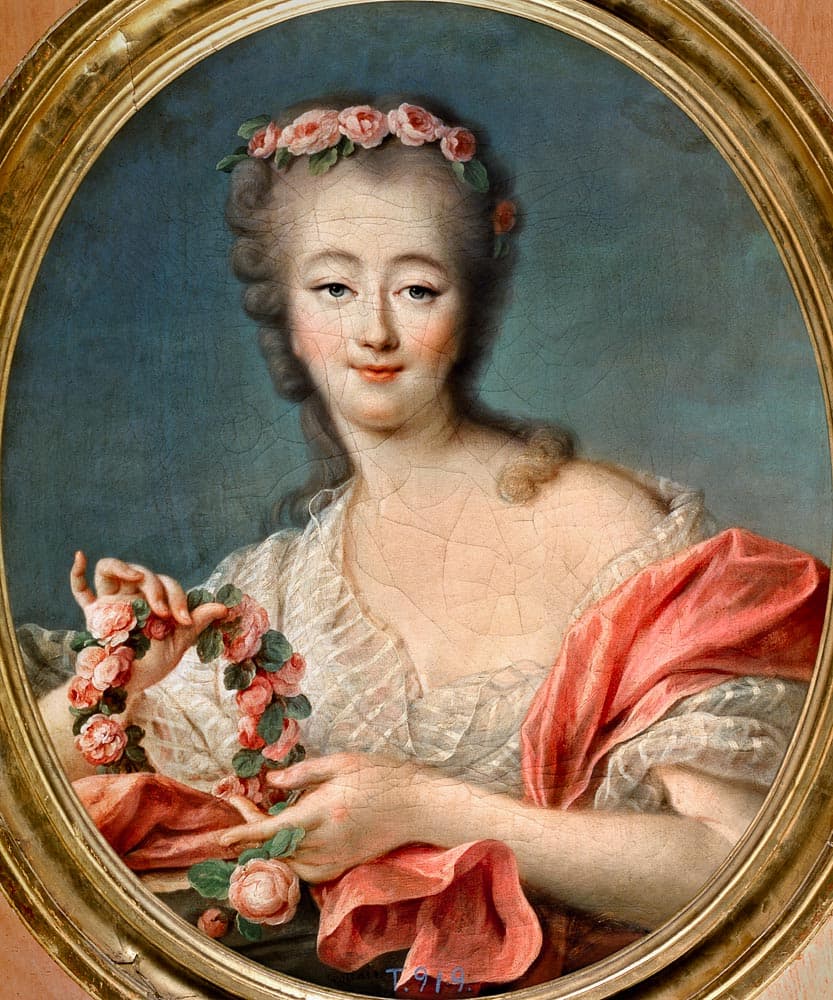
François-Hubert Drouais: Jeanne Bécu, Comtesse du Barry
A financier, who gives her all of his money to place on a gambling bet, courts Jeanne. Jeanne loses the bet and when the financier gets angry Count Dubarry replaces his loss and wins the heart to Jeanne. After a couple of weeks of cohabitation, Jeanne agrees to play along with the Count’s plans. She marries, purely on paper, the Count’s brother and becomes Countess Dubarry. When the Marshaless of Luxembourg hosts a grand ball, Jeanne is an invited guest. Jeanne is told that a messenger from the king would arrive and pick her up so she can have dinner with His Majesty. But things get complicated when she discovers that her former lover René is also at the ball. They are still in love with each other, but an intrigue arranged by Count Dubarry leads to a stormy confrontation. Jeanne tells René to get lost and is ready to accept the king’s invitation.
Millöcker/Mackeben: Die Dubarry, “Blicken dich zwei Augen an” (Ingeborg Hallstein, soprano; Gunter Kallmann Choir; Grosses Operetten Orchestra; Franz Marszalek, cond.)
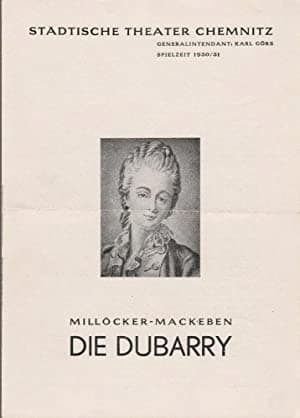
Millöcker/Mackeben: Die Dubarry
King Louis XV is enchanted by Jeanne’s beauty, and he assigns the Trianon Palace near Versailles as her residence. However, the Prime Minister is still looking to install his sister as the King’s mistress, and spreads the rumor that Jeanne is still in love with René. He arranges a secret meeting between Jeanne and René, with the king secretly overhearing the conversation. But there is really nothing to hear, as they sound like business partners ending their relationship for good. The King is overjoyed, and banishes the Prime Minister from the court. Jeanne, or better Madame du Barry has managed to become the most influential woman in all of France.
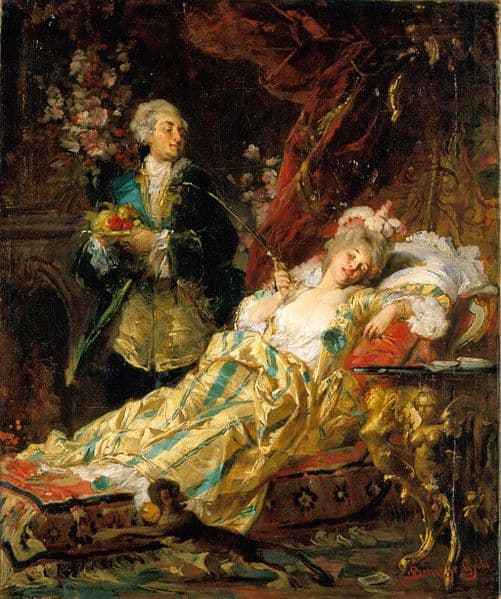
Gyula Benczúr: Louis XV and Madame Dubarry
The operetta ends well, but the real story did not end there. For four years, Madame du Barry was the official mistress of the king, but when he died of smallpox in 1774, she was banished from the Court. She went back to the convent for a while, but eventually found a new lover in the Governor of Paris, the Duke of Brissac. With the political situation deteriorating, Brissac was arrested for treason and eventually killed by a mob. Louis XVI was executed by guillotine on 21 January 1793, and his widow Marie Antoinette followed him to the guillotine in October of the same year. Jeanne Du Barry was arrested for crimes of aristocracy and treason on 22 September 1793 and executed in December. Her meteoric rise sadly came to a rather sticky end.
For more of the best in classical music, sign up for our E-Newsletter
Millöcker/Mackeben: Die Dubarry, “Wie schön ist alles” (Heinz Hoppe, tenor; Ingeborg Hallstein, soprano; Grosses Operetten Chorus; Grosses Operetten Orchestra; Franz Marszalek, cond.)
